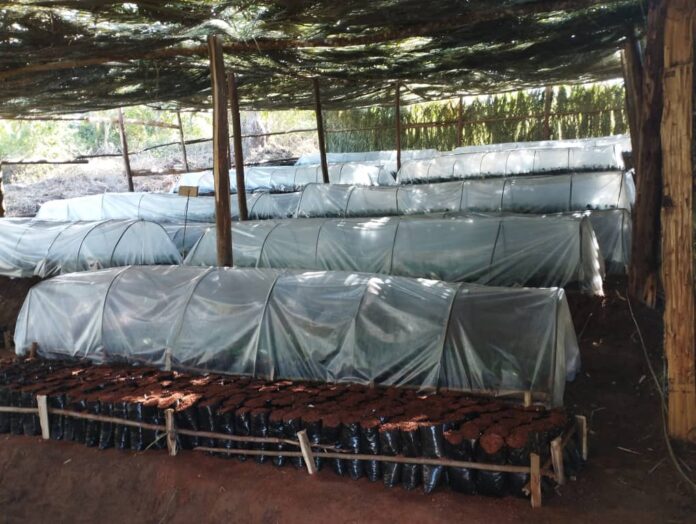In a major step towards empowering smallholder farmers in Thyolo, Malawi, Solidaridad has provided over 80,000 tea seedlings to more than 1,000 farmers across two tea growers associations (Chizunga and Msuwazi), as well as Mtendere cooperative.
In addition to the seedlings, Solidaridad supported these farmers with tea nursery construction and management materials such as wires, hoes, shovels, wheelbarrows, watering cans, planting pots, nails, and fertilizers. Solidaridad is also offering training on nursery management to equip them with the knowledge of good nursery management practices so they can produce good quality tea seedlings.
This is to address the challenge faced by smallholder farmers of lacking access to good quality seedlings which can help them produce more quality tea with the likelihood of being sold at a good price. Most of the tea growers still have old varieties, which result in low production and poor-quality tea leaves. By offering farmers construction materials, fertilizer, and essential training to boost productivity, it helps to bridge the gap in resource access, and create sustainable livelihoods in Malawi’s tea sector.
Bridging the Gap: Providing Vital Resources to Farmers
Tea seedlings are often expensive and difficult to source for smallholder farmers. Solidaridad’s support aims to bridge this gap by delivering over 80,000 high-quality seedlings, giving farmers the means to expand and improve their tea crops. This initiative is designed to help farmers boost their production and overcome the financial barriers that previously limited their growth.
“Many smallholder farmers simply don’t have the financial means to purchase quality seedlings. By providing these seedlings, along with construction materials and fertilizer, we are enabling farmers to increase their productivity and improve their livelihoods in a sustainable way,” says Given Phiri, Country Manager for Solidaridad (Malawi).
Sustainable Farming Through Training and Resources
Beyond the provision of seedlings, Solidaridad is investing in the long-term sustainability of the tea sector by offering specialized training and resources. Farmers are learning how to manage their crops more efficiently, using modern techniques that enhance productivity and environmental sustainability. The construction materials provided also allow farmers to build storage facilities and infrastructure, helping prevent post-harvest losses.
“Providing seedlings is just one part of the solution. Farmers also need the skills and resources to cultivate and maintain their crops effectively,” explains Misozi Magaleta, Project Manager Pathways to Prosperity (P2P) Tea. “The training and materials we provide are essential in ensuring that the farmers can realize the full potential of their tea fields and support their families,” adds Magaleta.
Promoting Gender Inclusivity in Malawi’s Tea Sector
Solidaridad’s initiative includes a strong emphasis on gender inclusivity, ensuring that women farmers are fully integrated and empowered in this process. “Empowering women in agriculture is key to driving inclusive growth in Malawi,” said Precious Greehy, Head of Gender and Youth at Solidaridad. “By ensuring that women have equal access to resources and training, we are creating opportunities for them to thrive and actively participate in the decision-making processes within their communities,” continued Greehy.
“Women play a critical role in tea farming in Malawi and often they are the ones performing the majority of labor in the fields. However, they frequently face challenges in accessing quality resources, training, and market opportunities, which limits their potential for economic empowerment. This initiative actively addresses these barriers by ensuring that women tea farmers have equitable access to seedlings, training on nursery management, and resources needed to establish and sustain successful tea enterprises,” added Nozipho Ndlovu, Regional Programme Manager of the Reclaim Sustainability Tea Program at Solidaridad.
Impacting Lives
This initiative is part of Solidaridad’s broader commitment to creating sustainable supply chains that are prosperous, inclusive, and in balance with nature. As demonstrated in Solidaridad’s theory of change, the program not only benefits farmers and workers but also strengthens supportive business ecosystems and enabling policy environments.
Through good practices, market uptake, and collaborative stakeholder engagement, Solidaridad is helping to build resilient supply chains that improve livelihoods and promote sustainability across the region. By empowering farmers, fostering inclusivity, and supporting sustainable frameworks, Solidaridad’s efforts are driving positive, systemic change within Malawi’s tea sector and across Southern Africa at large.








